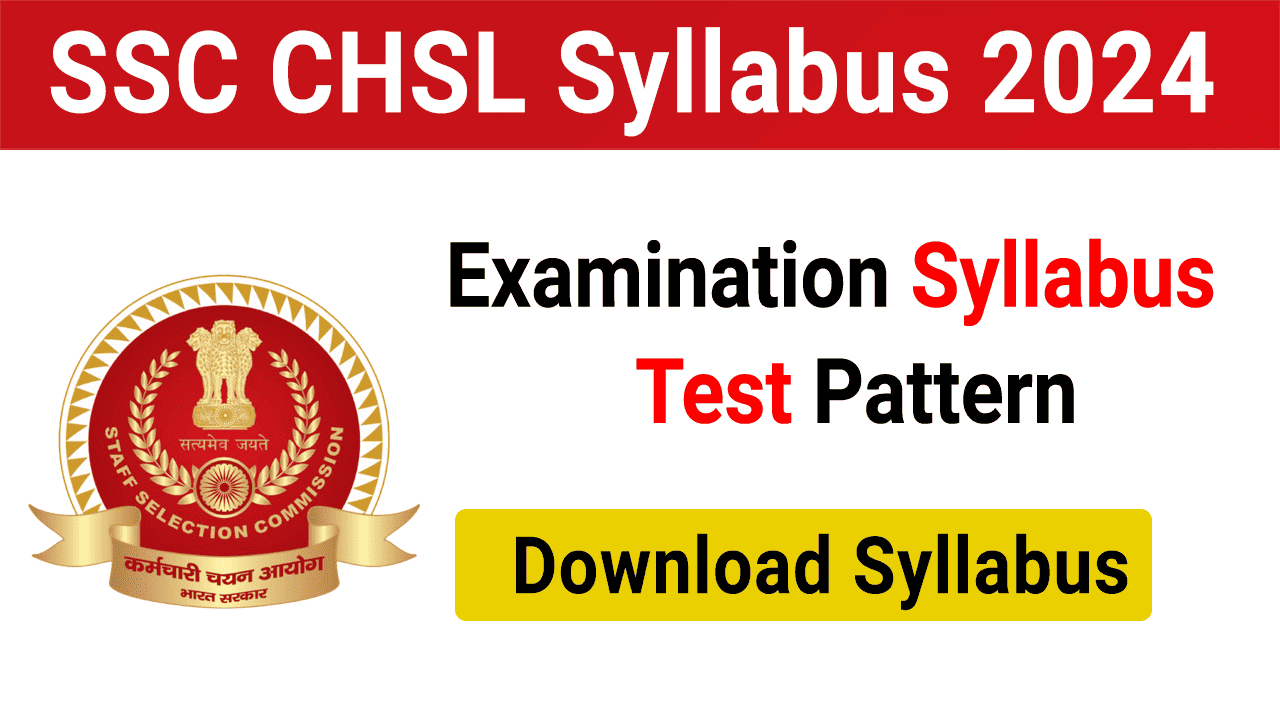SSC CHSL Syllabus 2024
Indicative Syllabus (Tier-I):
English Language : Spot the Error, Fill in the Blanks, Synonyms/ Homonyms, Antonyms, Spellings/ Detecting mis-spelt words, Idioms & Phrases, One word substitution, Improvement of Sentences, Active/ Passive Voice of Verbs, Conversion into Direct/ Indirect narration, Shuffling of Sentence parts, Shuffling of Sentences in a passage, Cloze Passage, Comprehension Passage.
General Intelligence : It would include questions of both verbal and nonverbal type. The test will include questions on Semantic Analogy, Symbolic operations, Symbolic/ Number Analogy, Trends, Figural Analogy, Space Orientation, Semantic Classification, Venn Diagrams, Symbolic/ Number Classification, Drawing inferences, Figural Classification, Punched hole/ pattern-folding & unfolding, Semantic Series, Figural Pattern-folding and completion, Number Series, Embedded figures, Figural Series, Critical Thinking, Problem Solving, Emotional Intelligence, Word Building, Social Intelligence, Coding and de-coding, Numerical operations, Other sub-topics, if any.
Quantitative Aptitude :
- Number Systems: Computation of Whole Number, Decimal and Fractions, Relationship between numbers.
- Fundamental Arithmetical Operations: Percentages, Ratio and Proportion, Square roots, Averages, Interest (Simple and Compound), Profit and Loss, Discount, Partnership Business, Mixture and Allegation, Time and distance, Time and work.
- Algebra: Basic algebraic identities of School Algebra and Elementary surds (simple problems) and Graphs of Linear Equations.
- Geometry: Familiarity with elementary geometric figures and facts: Triangle and its various kinds of centres, Congruence and similarity of triangles, Circle and its chords, tangents, angles subtended by chords of a circle, common tangents to two or more circles.
- Mensuration: Triangle, Quadrilaterals, Regular Polygons, Circle, Right Prism, Right Circular Cone, Right Circular Cylinder, Sphere, Hemispheres, Rectangular Parallelepiped, Regular Right Pyramid with triangular or square Base.
- Trigonometry: Trigonometry, Trigonometric ratios, Complementary angles, Height and distances (simple problems only) Standard Identities like sin2𝜃 + Cos2𝜃=1 etc.,
- Statistical Charts: Use of Tables and Graphs: Histogram, Frequency polygon, Bar-diagram, Pie-chart.
General Awareness : Questions are designed to test the candidate’s general awareness of the environment around him and its application to society. Questions are also designed to test knowledge of current events and of such matters of everyday observation and experience in their scientific aspect as may be expected of an educated person. The test will also include questions relating to India and its neighboring countries especially pertaining to History, Culture, Geography, Economic Scene, General policy and scientific research.
Indicative Syllabus (Tier-II) :
Module-I of Session-I (Mathematical Abilities) :
- Number Systems : Computation of Whole Number, Decimal and Fractions, Relationship between numbers.
- Fundamental arithmetical operations : Percentages, Ratio andProportion, Square roots, Averages, Interest (Simple and Compound), Profit and Loss, Discount, Partnership Business, Mixture and Alligation, Time and distance, Time and work.
- Algebra : Basic algebraic identities of School Algebra and Elementary surds (simple problems) and Graphs of Linear Equations.
- Geometry : Familiarity with elementary geometric figures and facts: Triangle and its various kinds of centres, Congruence and similarity of triangles, Circle and its chords, tangents, angles subtended by chords of a circle, common tangents to two or more circles.
- Mensuration : Triangle, Quadrilaterals, Regular Polygons, Circle, Right Prism, Right Circular Cone, Right Circular Cylinder, Sphere, Hemispheres, Rectangular Parallelepiped, Regular Right Pyramid with triangular or square Base.
- Trigonometry : Trigonometry, Trigonometric ratios, Complementary angles, Height and distances (simple problems only) Standard Identities like sin2𝜃 + Cos2𝜃=1 etc.
- Statistics and probability : Use of Tables and Graphs: Histogram, Frequency polygon, Bar-diagram, Pie-chart; Measures of central tendency: mean, median, mode, standard deviation; calculation of simple probabilities.
Module-II of Section-I (Reasoning and General Intelligence) :
Questions of both verbal and non-verbal type. These will include questions on Semantic Analogy, Symbolic operations, Symbolic/ Number Analogy, Trends, Figural Analogy, Space Orientation, Semantic Classification, Venn Diagrams, Symbolic/ Number Classification, Drawing inferences, Figural Classification, Punched hole/ pattern-folding & unfolding, Semantic Series, Figural Pattern-folding and completion, Number Series, Embedded figures, Figural Series, Critical Thinking, Problem Solving, Emotional Intelligence, Word Building, Social Intelligence, Coding and de-coding, Numerical operations, Other subtopics, if any.
Module-I of Section-II (English Language And Comprehension) :
Vocabulary, grammar, sentence structure, synonyms, antonyms and their correct usage; Spot the Error, Fill in the Blanks, Synonyms/ Homonyms, Antonyms, Spellings/ Detecting mis-spelt words, Idioms & Phrases, One word substitution, Improvement of Sentences, Active/ Passive Voice of Verbs, Conversion into Direct/ Indirect narration, Shuffling of Sentence parts, Shuffling of Sentences in a passage, Cloze Passage, Comprehension Passage. To test comprehension, two or more paragraphs will be given and questions based on those will be asked. At least one paragraph should be a simple one based on a book or a story and the other paragraph should be based on current affairs editorial or a report.
Module-II of Section-II (General Awareness) :
Questions are designed to test the candidates’ general awareness of the environment around them and its application to society. Questions are also designed to test knowledge of current events and of such matters of everyday observation and experience in their scientific aspect as may be expected of an educated person. The test will also include questions relating to India and its neighboring countries especially pertaining to History, Culture, Geography, Economic Scene, General policy and scientific research.
Module-I of Section-III of Paper-I (Computer Proficiency) :
- Computer Basics : Organization of a computer, Central Processing Unit (CPU), input/ output devices, computer memory, memory organization, back- up devices, PORTs, Windows Explorer, Keyboard shortcuts.
- Software : Windows Operating system including basics of Microsoft Office like MS word, MS Excel and Power Point etc.
- Working with Internet and e-mails : Web Browsing & Searching, Downloading & Uploading, Managing an E-mail Account, e-Banking.
- Basics of networking and cyber security : Networking devices and protocols, Network and information security threats (like hacking, virus, worms, Trojan etc.) and preventive measures.
